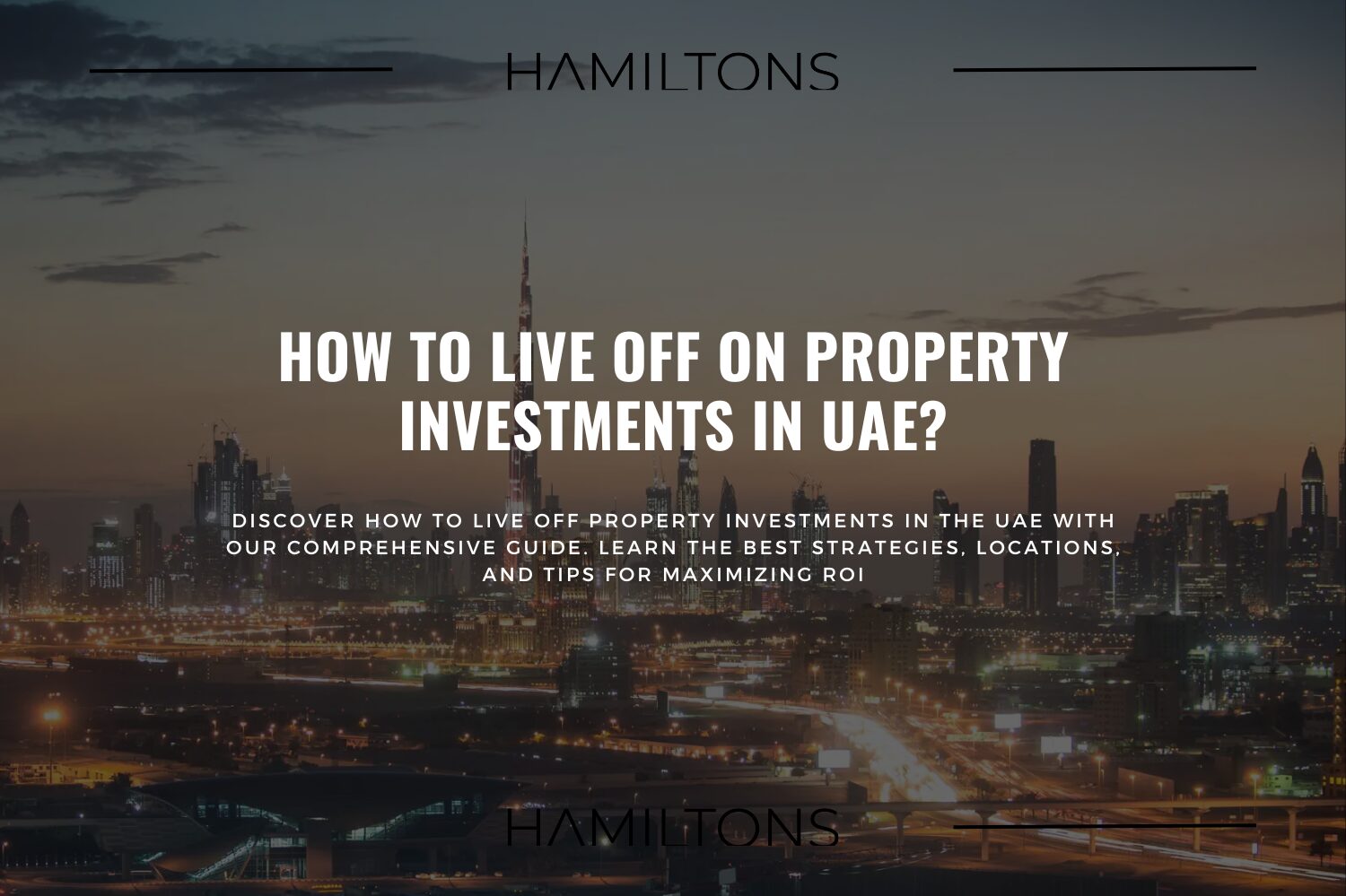When it comes to real estate, few places in the world are as dynamic and promising as the United Arab Emirates (UAE). With its rapid development, strategic location, and tax-free status, the UAE has become a hotspot for property investors from around the globe.
But how can you, as an investor, turn these opportunities into a steady stream of income that allows you to live off your property investments?
This guide will walk you through everything you need to know to make that dream a reality.
” Dubai Land Department seeks to achieve the objectives of the Dubai Government’s strategy in the real estate sector and improve land registration procedures. Track property sale transactions data-backed, to track previous year transactions for better idea. “
Understanding the Real Estate Market in the UAE
The UAE’s real estate market is a vibrant and evolving landscape. Cities like Dubai and Abu Dhabi are at the forefront, with towering skyscrapers, luxury developments, and innovative infrastructure projects.
The market is characterized by a mix of high-end luxury properties, affordable housing, and commercial spaces, catering to a diverse range of investors.
Key Cities for Property Investment
- Dubai: Known for its iconic skyline, Dubai offers a plethora of investment opportunities, from residential apartments in Downtown Dubai to villas in Palm Jumeirah.
- Abu Dhabi: As the capital, Abu Dhabi provides a more stable and long-term growth environment, with key areas like Saadiyat Island and Yas Island being particularly attractive.
- Sharjah and the Northern Emirates: These regions are gaining popularity for their affordability and potential for future growth.
In A Nutshell:
- Renting out properties means letting people live in them in exchange for money. In Dubai, many people want to rent homes in good areas, so you can make money by buying properties and letting others live in them for a long time.
- Invest in properties in places where they are likely to become more valuable over time. When the value of the properties goes up, you can sell them for more money than you bought them for.
- Short-term rentals are when people put their homes on websites like Airbnb for travelers to stay in. This is a good way to make money, especially if your home is in a popular vacation spot or during busy times for tourists.
- Buying buildings that are still being built for less money and selling them for more money after they are finished.
- Commercial properties are buildings where businesses operate, like offices, stores, or warehouses. They can make more money in rent than houses or apartments.
- REITs are like a special way to invest in real estate. Instead of buying a house or building, you can buy shares in a company that owns lots of properties. The company gives you some money back regularly, kind of like an allowance.
- Property flipping is when you buy a house that needs some fixing up, make it look nicer, and then sell it for more money.
- Partnering with others to work together and invest in big projects that can make more money.
- Buy a house in a fun place where lots of people like to visit. You can rent it out to others when you’re not using it.
- Leasehold properties are like borrowing a toy for a long time. You don’t have to pay as much at first, but you can make money by letting others use it and paying you.
- The best and easiest is investing into off market under construction real estate where you only need 20% down and the rest the developer provides you with an interest free payment plan for anywhere from 2–7 years.
Types of Property Investments in the UAE
Residential Properties
Residential properties are among the most popular investments in the UAE. They include apartments, villas, and townhouses, with varying levels of luxury and amenities. High demand for rental properties, particularly in Dubai, makes this a lucrative option.
Commercial Properties
Commercial real estate, including office spaces, retail outlets, and warehouses, can offer high returns, especially in business hubs like Dubai Marina and Downtown Dubai.
Off-Plan Properties
Off-plan properties, or those that are still under construction, often come at a lower price than ready-to-move-in properties. They can offer significant capital appreciation upon completion, making them a popular choice among investors.
Ready-to-Move-In Properties
These properties are available for immediate occupancy and can start generating rental income right away. They are often priced higher but come with less risk compared to off-plan investments.
Steps to Start Investing in Property in the UAE
Is It Wise to Invest In Property In the UAE?
Yes, investing in property in the UAE, particularly Dubai, can be a wise decision. The country has shown consistent economic growth, political stability, and a thriving real estate market. Factors like:
- Strong economic growth: The UAE has a diversified economy and is a global business hub. 1. UAE Economy www.mofa.gov.ae
- Tax advantages: No income tax or property tax can significantly boost returns.
- High rental yields: The demand for rental properties is consistently high, especially in prime locations.
- Infrastructure development: Ongoing investments in infrastructure enhance property values.
- Visa options: Property investment can often qualify you for residency visas. 1. Residency Visa through property investment in Dubai – Al Tamimi & Company www.tamimi.com
However, like any investment, it involves risks. Conduct thorough research, consider market trends, and consult with real estate experts before making a decision.
Where to Invest 10,000 AED in UAE?
With a relatively small amount like 10,000 AED, direct property investment might be challenging. You could consider:
- Real estate investment trusts (REITs): These allow you to invest in a portfolio of real estate properties through the stock market.
- Crowdfunding platforms: Some platforms offer opportunities to invest in real estate projects with smaller amounts.
- High-yield savings accounts: While returns might be modest, they offer safety and liquidity.
Remember: Investment decisions should align with your risk tolerance and financial goals.
What is the Average Return on Real Estate Investment in Dubai?
Average returns on real estate investment in Dubai can vary significantly based on property type, location, and market conditions. In recent years, Dubai has seen substantial property value appreciation, particularly in prime areas. However, past performance is not indicative of future results.
For the most accurate and up-to-date information, consult with a real estate expert or financial advisor.
Which Investment is Best in the UAE?
The best investment in the UAE depends on your individual circumstances, risk tolerance, and financial goals. Diversification is often key. Consider:
- Real estate: Offers potential for high returns but involves higher risks.
- Stocks and bonds: Provide exposure to the broader market and can be less volatile.
- Gold and other commodities: Can act as a hedge against inflation. 1. The Better Inflation Hedge: Gold or Treasuries? – Investopedia www.investopedia.com
- Business ventures: High-risk, high-reward potential, but requires expertise.
Always conduct thorough research or seek professional advice before making any investment decisions.
Research, Setting Investment Goals, and Market Analysis
Before diving into property investment, thorough research is essential. Understanding market trends, property values, and future developments will help you make informed decisions.
Determine what you want to achieve with your investment. Are you looking for short-term gains, long-term growth, or a steady rental income? Your goals will guide your investment strategy.
Consider your financing options carefully. Whether you choose to pay in cash, take out a mortgage, or opt for developer financing, understanding the costs involved is crucial.
Legal Aspects of Property Investment in the UAE
Ownership Laws for Foreigners
The UAE allows foreigners to own property in designated freehold areas. However, it’s important to understand the differences between freehold and leasehold properties and the implications for ownership and resale.
Property Registration Process
The process of registering a property in the UAE is straightforward but requires attention to detail. Ensure that all documentation is in order to avoid any legal complications.
Understanding Freehold vs. Leasehold
Freehold properties grant full ownership of the property and the land it’s on, while leasehold properties involve leasing the land for a set period, typically 99 years. Each has its own benefits and risks, depending on your investment goals.
Freehold – You own the property and the land it’s built on for as long as you want.
Leasehold – You own the property for a set period, but not the land it’s built on.
Financing Options for Property Investments in the UAE
Mortgages in the UAE
Many banks in the UAE offer mortgage options to both residents and non-residents. Understanding the terms, interest rates, and repayment plans is essential for making a smart investment.
Bank Loans vs. Developer Financing
While banks offer traditional loans, some developers provide financing options directly to buyers, often with flexible payment plans that can be tailored to your needs.
Using Cash vs. Financing
Paying in cash can offer advantages, such as quicker transactions and potential discounts, but it ties up capital that could be used for other investments. Financing allows for leveraging, but comes with interest costs and risks.
Choosing the Right Location
Prime Areas in Dubai
Neighborhoods like Downtown Dubai, Dubai Marina, and Palm Jumeirah are highly sought after for their luxury appeal and high rental yields. Investing in these areas can provide both rental income and capital appreciation.
Emerging Markets in Abu Dhabi
Abu Dhabi offers a more stable market with potential for long-term growth. Areas like Saadiyat Island and Yas Island are seeing increased development and demand, making them attractive for investors.
Northern Emirates: Opportunities and Risks
The Northern Emirates, including Sharjah and Ras Al Khaimah, offer more affordable investment options. However, these areas also come with higher risks due to less mature markets and slower growth.
Managing Your Property Investment
Hiring a Property Management Company
For investors who prefer a hands-off approach, hiring a property management company can be a smart move. These companies handle everything from tenant screening to maintenance, ensuring your investment remains profitable.
DIY Management: Pros and Cons
Managing your property yourself can save on management fees, but it requires time, effort, and knowledge of local regulations. Consider this option if you are comfortable handling tenants and property maintenance.
Tenant Management
Maintaining good relationships with tenants is key to a successful property investment. Clear communication, timely maintenance, and addressing tenant concerns promptly will help you retain good tenants and avoid vacancies.
Maximizing ROI on Property Investments
Strategies for Rental Income
To maximize rental income, consider offering furnished apartments, targeting expatriates, or focusing on short-term rentals through platforms like Airbnb.
Capital Appreciation Potential
Investing in areas with high growth potential, such as upcoming developments or regions with planned infrastructure improvements, can lead to significant capital appreciation over time.
Short-Term Rentals vs. Long-Term Leases
Short-term rentals can offer higher returns, but they require more management and can be subject to seasonal demand fluctuations. Long-term leases provide steady income with less effort but may offer lower returns.
Tax Implications for Property Investors in the UAE
Understanding VAT on Property Transactions
While residential property rentals are exempt from VAT, commercial properties are subject to VAT. Understanding these rules is crucial for financial planning and ensuring compliance with UAE tax laws.
Tax-Free Rental Income
One of the biggest advantages of investing in the UAE is the tax-free rental income. This allows investors to maximize their returns without the burden of income tax.
Potential Future Changes
While the UAE currently offers a favorable tax environment, staying informed about potential future changes is important for long-term planning.
Risks and Challenges in Property Investment
Market Volatility
The UAE property market can be volatile, with prices fluctuating due to economic conditions, geopolitical factors, and changes in government regulations. Being prepared for these fluctuations is essential for long-term success.
Regulatory Changes
Changes in property laws, ownership regulations, and tax policies can impact your investment. Staying informed and adapting to these changes will help you navigate the market successfully.
Managing Vacancies
Vacancies can significantly impact your rental income. To minimize this risk, invest in high-demand areas, maintain your property well, and set competitive rental prices.
Exit Strategies for Property Investors
Selling Your Property
When the time comes to sell, understanding the market conditions and timing of your sale can maximize your returns. Consider working with a real estate agent who knows the local market to get the best deal.
Renting vs. Selling: Which is Better?
Deciding whether to rent or sell your property depends on your financial goals and market conditions. Renting can provide ongoing income while selling can offer a lump sum return.
Timing the Market
The UAE property market is cyclical, with periods of rapid growth followed by slowdowns. Understanding these cycles and timing your entry and exit can significantly impact your returns.
Success Stories of Property Investors in the UAE
Case Study 1: High ROI in Dubai Marina
An investor purchased a 2-bedroom apartment in Dubai Marina at a low point in the market. Over five years, the property value increased by 50%, and the investor earned substantial rental income.
Let’s hear his words;
I have recently moved to Dubai for work. I’m from an EU country and don’t plan to live here long term, but my horizon is 3-5 years.
My rent is 120k AED p/a in Downtown. A similar apartment in the same area is 1.4mn AED to buy. If I took a 10 year mortgage my yearly mortgage payment would be ~130k AED. Assuming I stay here five years I see the following cases.
Worst Case: Property crash. My 1.4mn AED apt is now worth 800k AED. I lost 600k AED, which is the same as what I would have paid in rent at that time (120k p/a * 5).
Medium Case: Property stays the same. My 1.4mn AED apt is still worth 1.4mn. I sell it and effectively get a refund on my housing costs for the past five years
Best Case: Property boom. My 1.4mn AED apt is now worth 2.0mn. I sell it and effectively get a refund on my housing costs, plus a profit of 600k AED.
If the deposit isn’t an issue, and you earn enough to meet the repayments, it seems like a no-brainer to buy in Dubai in my situation.
Common Mistakes to Avoid
Overleveraging
Taking on too much debt can be risky, especially in a volatile market. It’s important to balance your investments with manageable financing to avoid financial strain.
Ignoring Market Trends
Failing to keep up with market trends can lead to poor investment decisions. Regularly reviewing market reports and staying informed about new developments will help you make better choices.
Underestimating Maintenance Costs
Property maintenance is an ongoing expense that should not be overlooked. Budgeting for repairs, renovations, and upkeep will ensure your property remains attractive to tenants and maintains its value.
Living off property investments in the UAE is a realistic and achievable goal for those who approach it with careful planning, research, and a clear understanding of the market. By investing wisely, managing your properties effectively, and staying informed about market trends and legal regulations, you can build a steady stream of income that supports your lifestyle and financial goals.
FAQs
- How much capital do I need to start investing in property in the UAE?
The amount of capital required depends on the type of property and its location. Entry-level investments can start from AED 500,000, but more lucrative opportunities may require a higher investment. - Can foreigners buy property in the UAE?
Yes, foreigners can buy property in designated freehold areas in the UAE. It’s important to understand the specific regulations related to foreign ownership in these areas. - What are the best locations for property investment in the UAE?
Prime locations in Dubai, such as Downtown Dubai, Dubai Marina, and Palm Jumeirah, are highly sought after. In Abu Dhabi, areas like Saadiyat Island and Yas Island are popular among investors. - Is it better to invest in residential or commercial property in the UAE?
Both options have their benefits. Residential properties often offer steady rental income, while commercial properties can provide higher returns but come with greater risks. - How can I ensure a high ROI on my property investment?
To maximize ROI, focus on high-demand locations, maintain your property well, consider short-term rentals, and stay informed about market trends and legal regulations.



